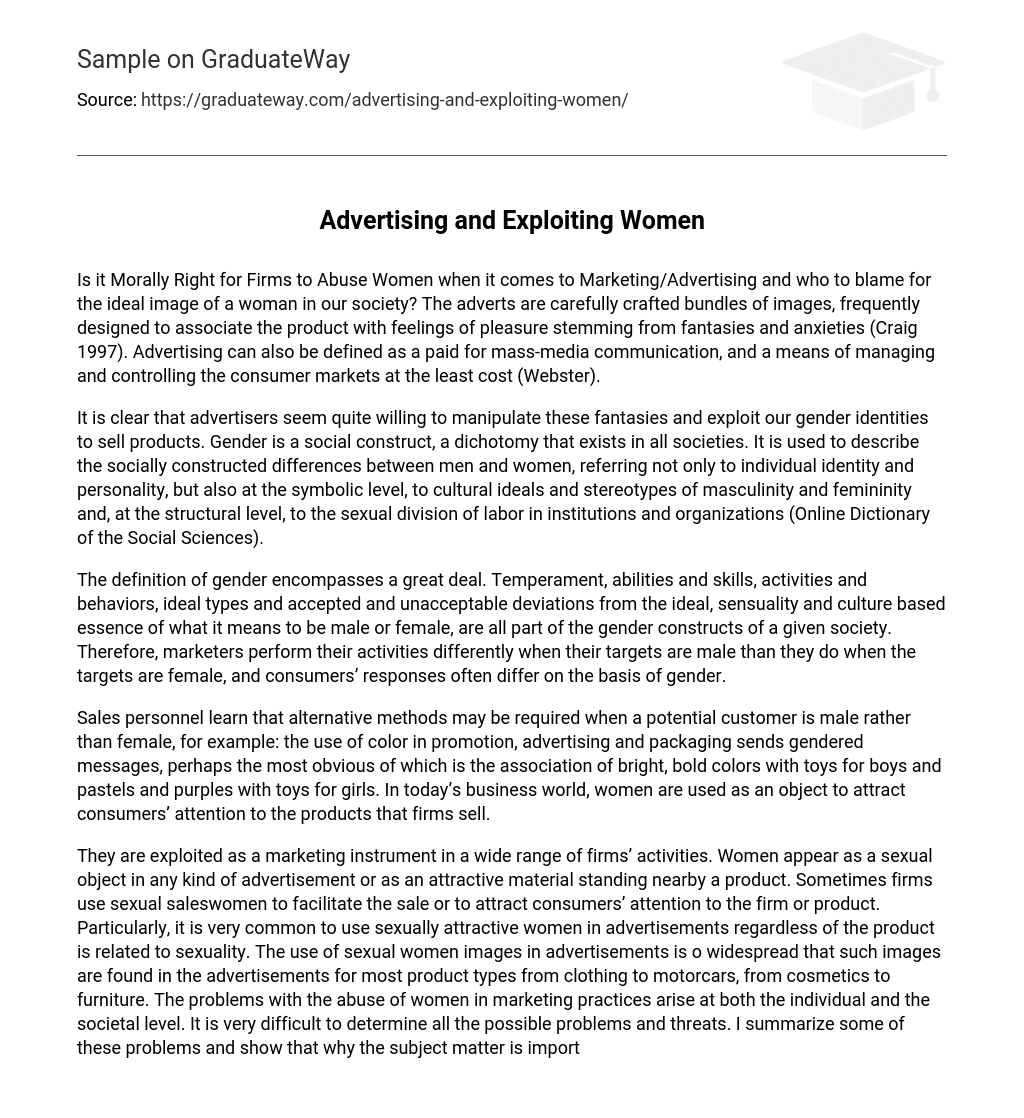Is it Morally Right for Firms to Abuse Women when it comes to Marketing/Advertising and who to blame for the ideal image of a woman in our society? The adverts are carefully crafted bundles of images, frequently designed to associate the product with feelings of pleasure stemming from fantasies and anxieties (Craig 1997). Advertising can also be defined as a paid for mass-media communication, and a means of managing and controlling the consumer markets at the least cost (Webster).
It is clear that advertisers seem quite willing to manipulate these fantasies and exploit our gender identities to sell products. Gender is a social construct, a dichotomy that exists in all societies. It is used to describe the socially constructed differences between men and women, referring not only to individual identity and personality, but also at the symbolic level, to cultural ideals and stereotypes of masculinity and femininity and, at the structural level, to the sexual division of labor in institutions and organizations (Online Dictionary of the Social Sciences).
The definition of gender encompasses a great deal. Temperament, abilities and skills, activities and behaviors, ideal types and accepted and unacceptable deviations from the ideal, sensuality and culture based essence of what it means to be male or female, are all part of the gender constructs of a given society. Therefore, marketers perform their activities differently when their targets are male than they do when the targets are female, and consumers’ responses often differ on the basis of gender.
Sales personnel learn that alternative methods may be required when a potential customer is male rather than female, for example: the use of color in promotion, advertising and packaging sends gendered messages, perhaps the most obvious of which is the association of bright, bold colors with toys for boys and pastels and purples with toys for girls. In today’s business world, women are used as an object to attract consumers’ attention to the products that firms sell.
They are exploited as a marketing instrument in a wide range of firms’ activities. Women appear as a sexual object in any kind of advertisement or as an attractive material standing nearby a product. Sometimes firms use sexual saleswomen to facilitate the sale or to attract consumers’ attention to the firm or product. Particularly, it is very common to use sexually attractive women in advertisements regardless of the product is related to sexuality. The use of sexual women images in advertisements is o widespread that such images are found in the advertisements for most product types from clothing to motorcars, from cosmetics to furniture. The problems with the abuse of women in marketing practices arise at both the individual and the societal level. It is very difficult to determine all the possible problems and threats. I summarize some of these problems and show that why the subject matter is important. Many studies have shown that women abuse in marketing practices negatively affects social values and women’s role in society.
Although the actual position of many women in society has improved significantly, the images of women in ads have not changed appreciably, and women are still being used as a marketing instrument in a way that degrades women’s, advertisements including females’ sexual images are exploiting women’s body, degrading the feminine role, and insulting societal etiquette. Studies also argue that sexuality is the cause of gender inequality (Baker 2005).
Another critic is that women make comparisons between the sexual images in the form of attractive models and themselves, with the result that advertisements including such images create negative effects and lower women’s satisfaction with their own appearance Lets take a look as some theories to backup the claim above. Considering utilitarian’s’ main view about business ethics and the problems with firms’ female abuse, we can argue that firms’ use of women, as a marketing instrument is an unethical action.
As discussed above, findings show that firms’ exploiting women leads to many problems at both the individual and the societal level, and thus, causes pain or brings unhappiness to a great number of people. It is clear that the pain or unhappiness that this strategy will bring to society is much greater than the pleasure or happiness it will bring to a few firms. Utilitarianism also considers the long-term consequences of actions for single individuals.
Considering the negative outcomes of women abuse, especially those on children, which may last for a long time and which may be very serious, again we can propose that the pleasure that will stem from the usage of women as a marketing instrument is too insignificant to take into account. In conclusion, the deductions from Utilitarian Approach to business ethics suggest that firms’ use of women, as a marketing instrument is an unethical behavior Considering Kant’s general approach, we can argue that firms’ use of women, as a marketing instrument is an unethical behavior.
Since firms use women as an object for only selfish ends and they do not have the right reason for doing that, according to Kant’s Approach, it is clearly unethical. Here, there is no need to take into account the negative consequences. It is enough to decide whether firms have the right reason for doing that. If we are to apply Kant’s first formulation to the issue in question, we need to construct the principle “It immorally permissible to abuse women in marketing practices” and then, ask whether such a principle can become a universal law for everyone.
The answer is “no” because this principle is self-defeating, claims that self-defeating actions are morally wrong and cannot be consistently universalized. REFERENCES 1. Craig, S. (Ed). (1997). Men, Masculinity and the Media. California: Sage Publications, Inc. 2. Goffman, E. (1976). Gender Advertisements. 3. Online Dictionary of the Social Sciences [Onhttp://bitbucket. icaap. org/dict. pl? alpha=G. 1. 4. Brierley, S. (2002). The Advertising Handbook. 5. Business Ethics: Decision-Making for Personal Integrity and Social Responsibility (Kant, Utilitarianism)





